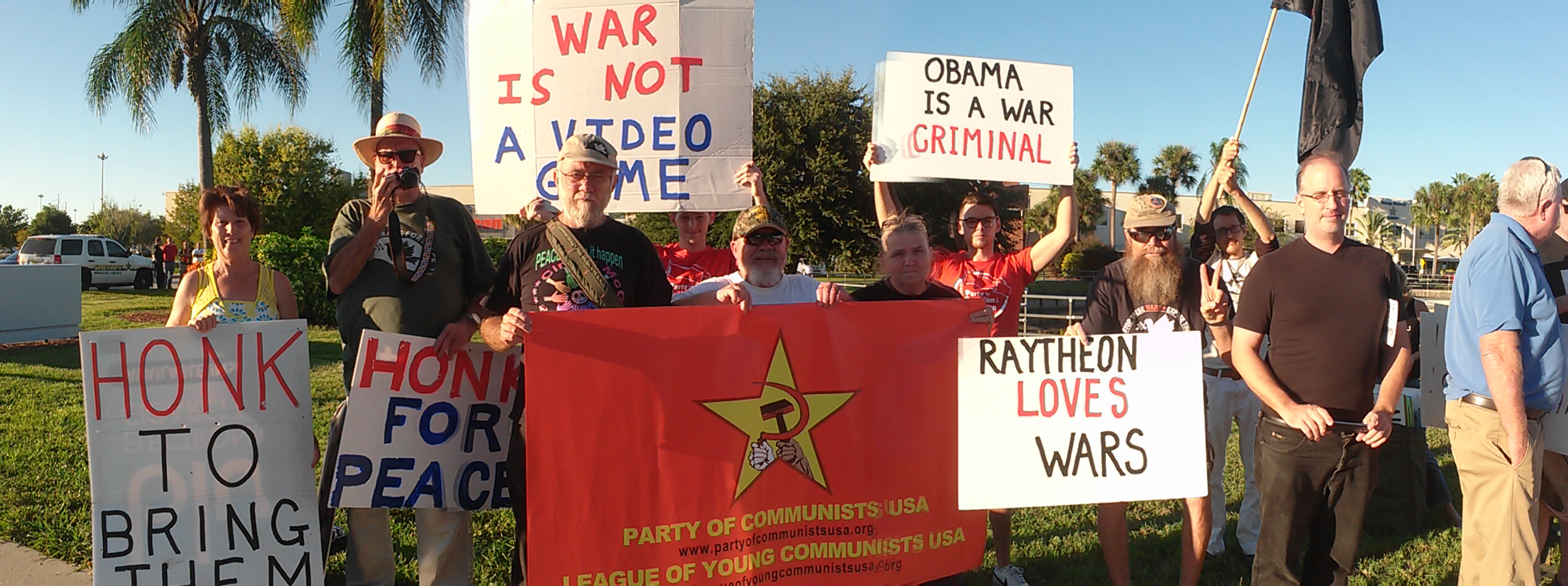 On October 17, activists organized to speak out against the defense contractor Raytheon, which recently received a $251.1 million contract to provide the U.S. Navy with Tomahawk cruise missiles for the following year. The Tomahawk cruise missile has been an integral part of the Obama administration’s military strategy due to its ability to kill large numbers of alleged combatants from faraway distances, without requiring “boots on the ground.” Florida is no stranger to the military-industrial complex. Raytheon, General Dynamics, Honeywell, and Lockheed Martin can all be found within Pinellas County alone.
On October 17, activists organized to speak out against the defense contractor Raytheon, which recently received a $251.1 million contract to provide the U.S. Navy with Tomahawk cruise missiles for the following year. The Tomahawk cruise missile has been an integral part of the Obama administration’s military strategy due to its ability to kill large numbers of alleged combatants from faraway distances, without requiring “boots on the ground.” Florida is no stranger to the military-industrial complex. Raytheon, General Dynamics, Honeywell, and Lockheed Martin can all be found within Pinellas County alone.
Raytheon will supposedly be providing these weapons of war to combat militants in the Islamic State in Iraq and Syria (ISIS), a group whose existence is a direct result of the destruction and occupation of Iraq by the United States. President Obama continues to claim that his war against the Iraqi and Syrian people is being waged for their own safety, but working class critics and peace activists know that these words ring hollow. The primary beneficiaries of this war are not Iraqis, nor Syrians, nor American workers, but wealthy defense contractors whose stock prices rise with every missile fired.
“The Tomahawk cruise missile developed by Raytheon is Obama’s weapon of choice”, said Dina Formentini, an organizer with St. Pete for Peace, “and he’s used a great number of them recently in Iraq and now in Syria, and that’s where this contract came from”. Formentini furthermore spoke to the dubiousness of the Obama administration’s assurances of surgical precision and regard for civilian well-being. She cited a study by the Columbia University Human Rights Institute regarding the administration’s drone program stating that, “for every suspected terrorist killed in a drone strike, 50 civilians are killed.”
The activists also spoke out against the burdens being placed on the working class in feeding the war machine. Jimmy Dunson, an activist with Food Not Bombs and St. Pete for Peace emphasized that, “We could be spending our energy and our money and our time on helping the homeless, for example. Feeding people who are hungry instead of building more missiles and more bombs, like Raytheon is doing, taking people’s lives.” The escalation of imperial war by the United States is accompanying cutbacks in the already meager social safety net, and is being countered by protest and solidarity. As Dunson said, “I’m here because I believe in love and in opposing war.”
The protest drew predominately positive feedback from the public, as thumbs-up, high fives, approving honks, and encouraging statements greeted the activists. “I want to say that now more than any time in my eight years doing this, that we have more honks, and more thumbs-up, and more positive support now than we’ve ever had before,” said Dina Formentini.
Outside of Raytheon, the people expressed an unwillingness to continue suffering for the profits of defense contractors and for the imperial interests of the United States. Formentini concluded by lamenting the divide between policy and popular sentiment by saying, “I just wish that voting and the elections would be representative of what we see when we’re here.”




